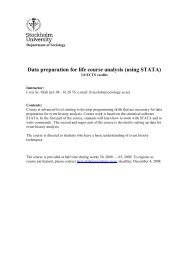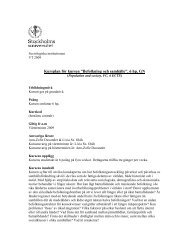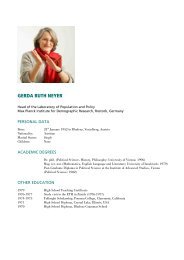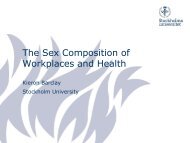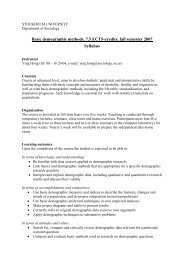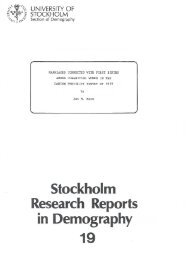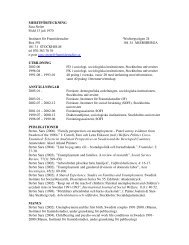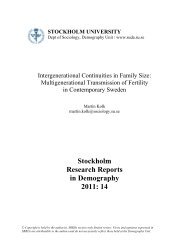Handbook for the Master's Programmes in Demography - SUDA
Handbook for the Master's Programmes in Demography - SUDA
Handbook for the Master's Programmes in Demography - SUDA
Create successful ePaper yourself
Turn your PDF publications into a flip-book with our unique Google optimized e-Paper software.
growth - and vice versa - are exam<strong>in</strong>ed <strong>the</strong>oretically as well as empirically.<br />
A fur<strong>the</strong>r question explored is whe<strong>the</strong>r high economic growth and poverty alleviation <strong>in</strong> <strong>the</strong> now<br />
poor countries is compatible with a non-deteriorat<strong>in</strong>g environment and without deplet<strong>in</strong>g <strong>the</strong><br />
resource base. How <strong>in</strong>ternational trade, <strong>in</strong>vestment and globalization of markets affect <strong>the</strong> poorest<br />
countries are also brought up, <strong>the</strong>oretically as well as empirically. F<strong>in</strong>ally, <strong>the</strong> question whe<strong>the</strong>r <strong>the</strong><br />
ma<strong>in</strong> constra<strong>in</strong>ts on development are economical or political is explored.<br />
The Swedish model<br />
7.5 ECTS credits<br />
”The Swedish model” has been seen as a “Third Way” <strong>in</strong> comb<strong>in</strong><strong>in</strong>g price stability and economic<br />
growth with full employment and general welfare. But is Sweden still an example to follow <strong>in</strong> a world<br />
of globalization The course analyses <strong>the</strong> macroeconomic per<strong>for</strong>mance of Sweden <strong>in</strong> terms of <strong>the</strong><br />
effects of <strong>the</strong> Swedish model from a comparative perspective. A central question: Do Sweden’s<br />
economic problems <strong>in</strong> <strong>the</strong> post-war period reflect economic policy mistakes or ra<strong>the</strong>r shortcom<strong>in</strong>gs<br />
of <strong>the</strong> model itself<br />
Department of Economic History<br />
Migration and economic growth: Sweden and <strong>the</strong> world, 1800-2000<br />
7.5 ECTS credits<br />
The aim of this course is to analyze from an historical demographic perspective economic growth<br />
versus poverty from pre-<strong>in</strong>dustrial society to <strong>the</strong> global society of today, <strong>in</strong>clud<strong>in</strong>g <strong>the</strong> transition to a<br />
post-<strong>in</strong>dustrial service society. The vary<strong>in</strong>g patterns of population development <strong>in</strong> Sweden and <strong>the</strong><br />
world from 1800 to 2000 are exam<strong>in</strong>ed, as well as <strong>the</strong>ories about demographic change beg<strong>in</strong>n<strong>in</strong>g<br />
with Malthus’ <strong>the</strong>ory of <strong>the</strong> relationship between poverty and uncontrolled fertility. The course<br />
discusses different manifestations <strong>in</strong> history of <strong>the</strong> transition from a primarily agrarian society dur<strong>in</strong>g<br />
<strong>the</strong> early 1800s to <strong>the</strong> urbanized <strong>in</strong>dustrial society that developed dur<strong>in</strong>g <strong>the</strong> 1900s. Extensive and<br />
susta<strong>in</strong>ed migration between regions as well as between countries and cont<strong>in</strong>ents is paid particular<br />
attention. Increas<strong>in</strong>g mobility with<strong>in</strong> and between countries is seen as sett<strong>in</strong>g <strong>the</strong> conditions <strong>for</strong><br />
<strong>in</strong>creas<strong>in</strong>g wealth and social welfare. Women’s <strong>in</strong>creased rights and liberties are a fundamental and<br />
obvious part of this development.<br />
Fem<strong>in</strong>ist <strong>the</strong>ories, economic restructur<strong>in</strong>g and <strong>the</strong> gendered global division of labor1600-<br />
2000<br />
15 ECTS credits<br />
The focus of this course is to analyze economic restructur<strong>in</strong>g <strong>in</strong> different historical periods and<br />
geographical areas from a fem<strong>in</strong>ist perspective. Of special <strong>in</strong>terest will be <strong>the</strong> production and<br />
reproduction of gendered global divisions of labour. The course will also highlight and deconstruct<br />
traditional constructions of economic historical periods, <strong>for</strong> <strong>in</strong>stance did <strong>the</strong> <strong>in</strong>dustrialisation have<br />
<strong>the</strong> same consequences <strong>for</strong> women and men The course's ma<strong>in</strong> analytical perspective is fem<strong>in</strong>ist,<br />
but will also discuss questions and mean<strong>in</strong>gs of class, ethnicity, sexuality and nationality and will<br />
<strong>the</strong>re<strong>for</strong>e touch upon post-colonial <strong>the</strong>ory. Ideas about gender shape and are embedded <strong>in</strong><br />
economic development, and have repercussions on how women's and men's work is valued but also<br />
on how labour divisions on labour are <strong>for</strong>med <strong>in</strong> practice.



